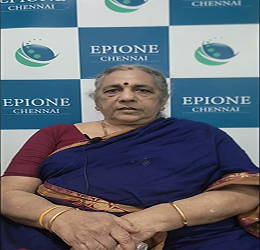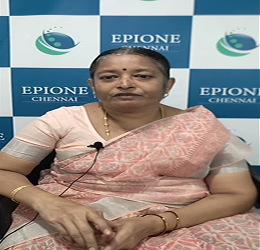9962 413 413
Book Appointment
I finally got relief from my back pain thanks to Epione
Mrs. Aswathi Subramanyan
Back Pain Treatment
My sister suffered from Knee pain for 5 years but finally found pain relief at Epione
Mrs. Chandra
Foot and Ankle Pain Treatment
Dr Chetana Chetan help me from knee pain due to arthritis
Mrs. Kavitha
Foot and Ankle Pain Treatment
Migraine Headache Treatment
in Chennai
Almost everyone on the earth might have had experienced headache atleast once in their lifespan. More than 90 % would have never gone to a specialist or the best doctor for migraine in Chennai for treatment. Either rest or over the counter medications might have solved their problem . Migraine headaches can be literally jeopardizing the lifestyle of people for extended length of time.
What is Migraine?
A migraine headache is characterised by sharp, throbbing pain on one side of the brain. It is frequently associated with nausea, vomiting, and light and sound sensitivity. Migraine attacks can stay for hours or days, and the pain can be severe enough to interfere with routine tasks.
A warning sensation known as an aura develops before or with the headache in some people. Auras can involve visuals like flashes of light or blind spots and physical symptoms, including a tingling sensation on one side of the face, arm, or leg, and difficulties speaking.
Some migraine medications, recommended by the pain management doctors in Chennai, can help prevent migraines and make them less uncomfortable. The correct medications, in conjunction with self-help, can help.
What Causes Migraine?
Though the exact origins of migraines are unknown, heredity and environmental factors appear to play a role.
It is primarily due to an imbalance in neurotransmitters.
There are several migraine triggers, such as:
- When the oestrogen levels fluctuate, such as before or during menstruation, pregnancy, and menopause.
- Hormonal drugs, such as oral contraceptives
- Drinks like alcohol, particularly wine, and excessive caffeine consumption
- Stress
- Bright lights, as well as loud sounds
- Strong odours, such as perfume and paint thinner
- Sleeping patterns shift
- A change in weather or barometric pressure
- Food supplements like sweetener aspartame.
What are the Symptoms of Migraine?
Migraine symptoms can appear 1 to 2 days before the headache. One may experience the following symptoms:
- Heightened light and sound sensitivity
- Nausea
- Feeling dizzy or faint
- Pain on one side of the head, either left or right, front or back, or in the temples
- Throbbing and pulsing headache
- Tiredness or a lack of energy
- Having problems speaking clearly
- Tingling or prickling sensations in the face, arms, or legs
It is recommended to seek migraine headache symptoms treatment, especially if the pain is severe.
What Are the Types of Migraines?
Migraines come in different forms, each with its own symptoms and triggers, but all can be equally frustrating. At Epione, we help you understand your migraine type so you can manage it better with targeted migraine headache treatment in Chennai.
- Migraine with Aura: These come with warning signs like flashing lights, blind spots or tingling sensations in the face or hands before the headache strikes. Triggers often include stress, bright lights and certain foods.
- Migraine without Aura: The most common type, these don’t have visual warnings. Symptoms usually include throbbing pain on one side of the head, nausea and light/sound sensitivity.
- Chronic Migraine: If you experience headaches for 15 or more days a month, this might be chronic migraine. It can severely affect daily life and often needs long-term treatment.
- Acute Migraine: These occur less frequently and usually respond well to medication. Triggers can be food, dehydration or lack of sleep.
- Vestibular Migraine: This type causes dizziness, balance issues and vertigo, sometimes with or without the headache. It is often triggered by motion or visual stimulation.
- Menstrual Migraine: Linked to hormonal changes, these occur around your period and can be especially intense.
At Epione, we personalise your migraine trigeminal neuralgia treatment in Chennai based on your type for better relief and fewer surprises.
How to Diagnose Migraine?
A headache specialist (neurologist) will most likely diagnose migraines based on the medical history, symptoms, and a physical and neurological examination.
If your disease is rare, complex, or worsens rapidly, tests to rule out alternative reasons for your pain may include:
- Magnetic resonance imaging (MRI): An MRI scan produces detailed images of the brain and blood arteries using magnetic fields and radio waves.
- CT scan: A CT scan creates comprehensive cross-sectional images of the brain by using a sequence of X-rays. This aids clinicians in diagnosing cancers, infections, and other diseases.
What are the Complications of Migraine?
Taking pain relievers often can result in medication-overuse headaches. Medication-overuse headaches develop when drugs stop treating pain and start causing headaches. Combinations of aspirin, acetaminophen, and caffeine can result in overuse headaches when taken for more than 14 days per month.
How is Migraine Treated?
The best treatment for migraine headache aims to reduce symptoms and prevent future episodes.
Migraine medications are classified into two categories:
- Medication for pain relief
- Medication for prevention
The treatment aims to avoid the triggers and reduce symptoms. There is no definitive treatment to get over with migraine yet.
Interventional Pain Management
Treatments for Interventional Pain Management;
- Sphenopalatine Ganglion block — The sphenopalatine ganglion is a small organ buried inside the skull about the size of a grain of corn. It is responsible for transmitting pain from the face to the brain, among other things. One can successfully halt pain signals from reaching the brain by applying a modest quantity of local anaesthetic to it. If the block works, your doctor may suggest radiofrequency ablation to provide long-term pain relief. This therapy is helpful for several sorts of facial pain; thus, it can function even if the particular diagnosis is uncertain or ambiguous.
- Stellate Ganglion Block – Stellate ganglion is a well-known element of the sympathetic nervous system for its function in pain transmission. To prevent pain signals from reaching the brain, a small dose of Bupivacaine, a long-acting local anaesthetic, is injected near the ganglion using ultrasound guidance.
- Spinal Cord Stimulation– It is a treatment used to treat several pain disorders. Small electrodes are inserted in the epidural area near the spinal cord, similar to the technology used in cardiac pacemakers. These electrodes will provide a modest electrical current that will interfere with pain signals as they pass through the spinal cord. The leads are put in the neck to stimulate nerves in the back of the head and the face in the case of facial pain.
Why Choose Epione Chennai?
When it comes to lasting pain relief, Epione Chennai stands out as a centre of excellence. We combine expert care with the latest medical technology to ensure every patient receives world-class treatment in a comforting environment.
At Epione, our experienced doctors specialise in a range of conditions; from chronic headaches to joint and nerve pain. As the best hospital for migraine treatment in Chennai, we offer accurate diagnostics and advanced therapies tailored to your specific condition. Our focus is not only on managing symptoms, but also on addressing the root cause that ensures lasting relief.
If you are searching for treatment for knee pain without surgery, look no further. We provide innovative non-surgical solutions, including regenerative medicine, physiotherapy and interventional procedures that help restore movement and improve quality of life without going under the knife.
What truly distinguishes us is our personalised treatment plans. Every patient’s pain is unique and so is their path to recovery. Our team ensures that each treatment plan is customised to suit your lifestyle and medical history with ongoing support throughout your healing journey.
Are you ready to take the first step towards healthy living without pain? Book an appointment with Epione today and feel the difference.
Frequently Asked Questions
What is the main cause of migraines?
Migraines are often triggered by genetics, hormonal changes, stress, sleep issues, certain foods or environmental factors affecting brain chemistry and blood flow.
How to deal with a migraine?
Rest in a dark, quiet room, hydrate, take prescribed medication, apply cold compresses and practice relaxation techniques to ease symptoms and prevent them from worsening.
What are the three types of migraines?
The three main types of migraine are migraine with aura, chronic migraine and migraine without aura, each differing in symptoms, frequency and neurological involvement.
Can lifestyle cause migraines?
Yes, poor sleep, skipping meals, dehydration, excessive screen time, stress and irregular schedules can all trigger or worsen migraine attacks over time.
Is migraine a serious problem?
Migraines can impact the quality of life, productivity and mental health. While not typically life-threatening, chronic migraines require proper diagnosis and ongoing management.
Are migraines harmful?
Migraines can be debilitating, leading to missed work, anxiety and sleep disruption. Chronic migraines may also increase the risk of other health conditions over time.
What stops migraine fast?
Triptans, NSAIDs, rest, hydration, cold compresses and early intervention of the migraine headache treatment in Chennai at the first signs can stop or significantly reduce migraine severity quickly.
How long do migraines last?
Migraine attacks typically last 4–72 hours, depending on type and treatment. Duration varies by individual and can be reduced with effective management.
How to select the best doctor for migraine disorder treatment?
Choose a neurologist or the best doctor for migraine in Chennai with experience in migraine care, considering patient reviews, up-to-date treatments and a personalised, compassionate approach.
What are the risk factors for migraine or tension headaches?
Genetics, stress, hormonal changes, sleep problems, eye strain, caffeine and posture issues can increase the likelihood of migraines or tension-type headaches.
Is migraine headache curable?
Migraines aren’t curable, but they are manageable. With proper migraine treatment in Chennai, lifestyle changes and preventive care, frequency and severity can be greatly reduced.
Are migraines life threatening?
Migraines are usually not life-threatening, but they can mimic or be linked to severe conditions like stroke. Always consult a doctor for persistent symptoms to receive the best treatment for migraine headache.
Are migraines genetic?
Yes, migraines often run in families. If one or both parents have migraines, the chances of experiencing them increase significantly.
Why does migraine cause nausea?
Migraines affect brain areas involved in digestion. Changes in serotonin levels and the brainstem’s role in nausea contribute to this common symptom.




